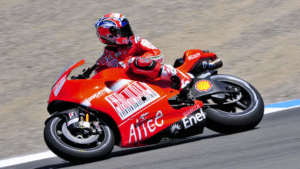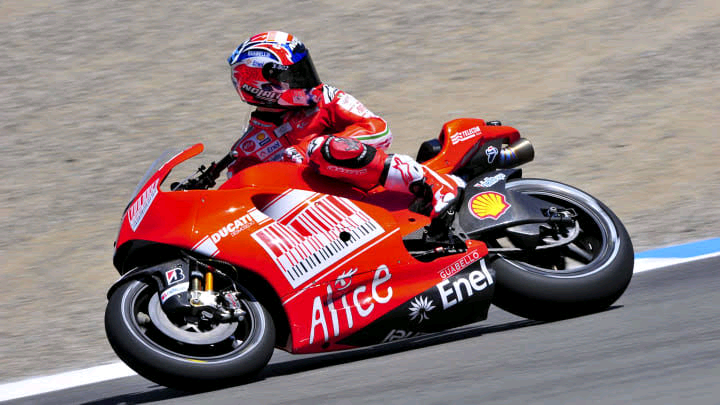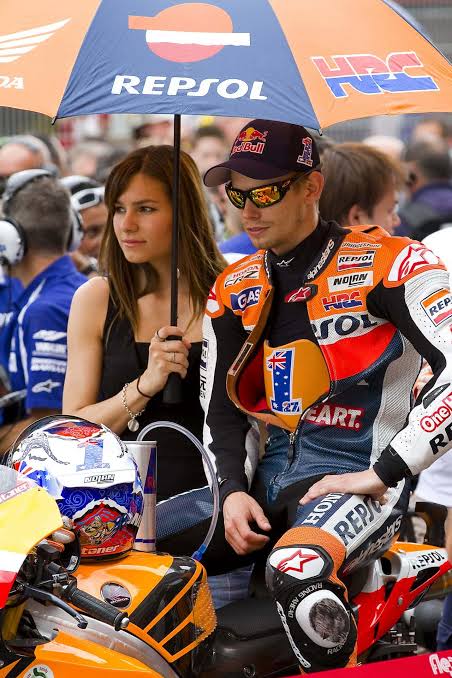Casey Stoner’s Heartbreaking Confession I Didn’t Know Why They Hated Me So Much”
MotoGP has long been a battleground of fierce competition, high-octane adrenaline, and complex personalities. Among the sport’s most compelling figures is Casey Stoner, the Australian phenom whose career was marked by extraordinary talent, relentless determination, and, at times, intense controversy. Recently, the retired rider opened up in a rare and candid interview, revealing a deeply personal and heartbreaking reflection: *”I didn’t know why they hated me so much.”* This confession has sent ripples through the motorcycle racing community, prompting fans and experts alike to reevaluate Stoner’s journey and the challenges he faced in his illustrious career.
The Rise of Casey Stoner: A Brief Overview

Born in South Australia in 1985, Casey Stoner quickly established himself as a prodigious talent in motorcycle racing. His aggressive riding style, combined with a natural flair for racing, propelled him through the ranks of MotoGP, where he made his debut in 2006 with the Ducati team. By 2007, at just 21 years old, Stoner had already made a significant mark, showcasing his potential as a future world champion.
His career truly skyrocketed with his move to Honda in 2008, where he clinched his first MotoGP World Championship in 2011. Known for his raw speed and technical mastery, Stoner was often regarded as one of the most talented riders of his generation. But behind the scenes, his journey was not without hardship.
The Controversies and Challenges
Stoner’s career was punctuated with intense rivalries, media scrutiny, and internal struggles. His straightforward and sometimes blunt demeanor often put him at odds with teams, management, and media personalities. Notably, his contentious relationship with the Honda team management and his outspoken criticisms of certain race strategies made him a polarizing figure.
One of the most significant sources of tension was his time with Ducati. While he achieved remarkable success with the Italian manufacturer, the environment was often described as tumultuous. Stoner’s dissatisfaction with the bike’s handling and the team’s management sometimes led to public disputes, further fueling the perception of him as a challenging personality.
However, despite these conflicts, many fans admired his authenticity and relentless pursuit of victory. Yet, beneath this tough exterior, Stoner battled his own inner demons—injuries, burnout, and the pressure of maintaining peak performance.
The Heartbreaking Confession
In a recent interview marking his retirement anniversary, Casey Stoner opened up about the emotional toll of his racing career. With a somber tone, he stated:
*”I didn’t understand why they hated me so much. I thought I was just doing my job, racing as hard as I could. But looking back, I realize there was a lot more going on beneath the surface. It hurt more than I ever let on, and sometimes I felt like I was fighting a battle I didn’t even understand.”*
This confession reveals a deeply personal side of Stoner that many in the sport had previously speculated about but never fully understood.
He elaborated on the feeling of alienation and misunderstood intentions:
*”I always tried to be honest and straightforward. Maybe that rubbed some people the wrong way. Maybe I was too honest about my frustrations. But I never wanted to hurt anyone—I just wanted to race, to win, and to be the best. Yet, I often felt like I was the villain in their story, even when I didn’t know what I had done wrong.”*
The Roots of the Hated Perception
While Stoner’s frankness and aggressive style earned him enemies, the roots of the perceived hatred may be more complex. Several factors contributed:
– **Riding Style and Attitude:** His uncompromising approach on the track was admired by fans but seen as confrontational by rivals and team officials.
– **Media Portrayal:** The media often sensationalized conflicts, framing Stoner as a difficult or arrogant rider, which may have amplified negative perceptions.
– **Team Dynamics:** Tensions within teams, especially with Honda and Ducati, were sometimes misinterpreted as personal animosity, adding to the narrative of him being disliked.
– **Personal Expectations and Burnout:** Stoner’s intense focus and physical toll led to burnout, which might have affected his interactions and mood, influencing how others perceived him.
Reflection and Impact
Stoner’s heartfelt revelation has prompted a wave of introspection within the MotoGP community. Many fans and former colleagues have expressed sympathy, acknowledging the immense pressure the Australian faced behind the scenes.
Former teammates and rivals, such as Dani Pedrosa and Valentino Rossi, have commented on Stoner’s honesty and the emotional struggles that come with professional racing at the highest level. Rossi, in particular, remarked:
*”Casey was a fierce competitor, but he’s also a human being. His honesty is admirable, and I think many of us didn’t realize how much he was carrying inside.”*
This acknowledgment underscores the importance of mental health awareness and the need for empathy in high-stress sports environments.
The Lessons Learned
Stoner’s candid confession underscores several vital lessons about the world of professional sports:
1. **The Human Side of Athletes:** Behind the medals and podiums are individuals battling personal struggles, insecurities, and emotional pain.
2. **The Power of Honesty:** Speaking openly about difficulties can foster understanding, reduce stigma, and promote a healthier sporting environment.
3. **The Need for Support Systems:** Teams, fans, and organizations must prioritize mental health and provide support for athletes facing internal battles.
4. **Breaking the Cycle of Misunderstanding:** Clear communication and empathy can help bridge gaps between athletes, media, and fans, fostering a more positive community.
Looking Forward: Stoner’s Legacy
Though Casey Stoner retired from MotoGP in 2012 at the age of 27, his influence endures. His career serves as a testament to raw talent, resilience, and the importance of mental well-being.
His recent revelations have opened the door for more honest conversations about athlete mental health and the pressures of professional racing. As the sport continues to evolve, embracing these lessons will be crucial in nurturing future generations of riders.
Casey Stoner’s heartfelt confession — *”I didn’t know why they hated me so much”* — is more than just a personal revelation; it’s a call for understanding and compassion in the high-stakes world of MotoGP. His openness not only humanizes one of the sport’s most talented riders but also highlights the importance of empathy, mental health awareness, and the recognition that behind every champion is a person facing their own battles.
As fans and the sporting community reflect on his words, one thing becomes clear: true greatness lies not only in victories on the track but also in the courage to confront and share one’s vulnerabilities. Casey Stoner’s story is a powerful reminder that behind every fierce competitor is a human being, deserving of respect, understanding, and empathy.


